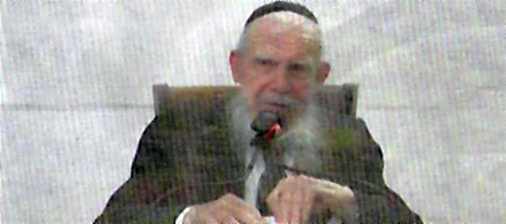HaRav Gershon Edelstein shlita

The following presents special guidance offered by HaRav Edelstein from his home to the students of Shiur Gimmel who are being tested these days for acceptance into yeshivos gedolos, and to their parents as well. His incisive message stated that over the years, he has learned that those students who exert pressure to be accepted to yeshivos which refused to do so to begin with, and finally were admitted — did not do so well at all.
He said: "I would like to remind the public of an erroneous conception they have. Many students are finishing their studies in yeshivos ketanos and entering yeshivos gedolos during this coming Elul session. Each student decides which yeshiva he would like to attend and makes efforts that he be accepted there. Sometimes he may set his sights upon a certain prestigious yeshiva which has rejected him to begin with. And yet, he will make supreme efforts and persevere through all means and ways, together with his parents, without taking into consideration that all is Heaven ordained in any case, and that all which Hashem decrees is ultimately for the best.
"He should understand that he will do best in a place that is willing to accept him. If a yeshiva is not inclined to accept him but he will nevertheless make a great effort to go there anyway, he will not succeed in his studies. This rule has been tried and tested all the time, while whatever Hashem does decree is always in his best interest. Everything is organized from Heaven for his good, that he succeed where he will best fit in and where he is welcome. Conversely, if a yeshiva feels that he is not suited, he will not do well if he pushes his way in through influence. If he perseveres, he will only lose out."
The Rosh Yeshiva went on to discuss current issues, saying, "We find ourselves during the period of Bein Hametzorim. The Mishna Berurah writes in the name of Ari Hakodosh that one should mourn [especially] at noontime, and weep for half an hour, for we certainly have what to cry about: the destruction of the Beis Hamikdosh of these times. Chazal say that whoever mourns over Yerushalayim will merit to see it in its joy, but whoever does not lament and does not feel the lack of the Beis Hamikdosh and does not care, will not have the merits enabling him to see the [third] Beis Hamikdosh and its rejoicing."
He went on to describe our obligation for optimal security and safety during these days. "The Bein Hametzorim period is the time of destruction and strict judgment. This is why we learn from pesukim of the many things of which we must be cautious at such a time when the world is in the mode of Din, much more so that in usual times.
"This period is dedicated to repentance over the sins which led to the Churban. The Rambam writes in Hilchos Taanis that all the fast days which Chazal instituted in commemoration of the Churban were designed to arouse us to repent over those sins which originally led to the Destruction, for if we still find ourselves with this Destruction, it is a sign that those sins are still rampant. As Chazal said: Every generation in which the Beis Hamikdash is not rebuilt, it is as if it were destroyed in that generation. In other words, each generation is to be blamed for the continuation of that Churban since the sins which caused it originally have not been rectified.
"The Tanoim and Amoroim and all the tzaddikim [of past generations] are surely not to blame for the Churban but rather, each generation per se, and the public excepting the tzaddikim in its midst, is blameworthy for they persist in those selfsame sins and evil traits which caused it to begin with.
"This is why we must toil on character perfection, tikkun hamiddos. Let us replace unfounded hatred with unfounded love, not that this is really unfounded but because it is mandatory: Love your fellow man as yourself. If all of us, or at least the majority of the public, were to embrace this, it would rectify the sin that caused the Churban. If the Churban is still extant, it is because we have not rectified our bad middos. So here we have the key to amend the Churban — by improving our middos.
"The very problem lies in the fact that we don't realize or admit that we need to improve ourselves; everyone thinks that he is fine, and if he does harbor rancor against another, it is not unfounded hatred. Rather, it is justifieš The advice to counter this is simply to examine one's deeds and attitudes through the study of Mussar. Establishing steady sessions in Mussar creates much merit. This is the best advice to progress and ascent from level to level, steadily, and become a person striving continually for improvement."




